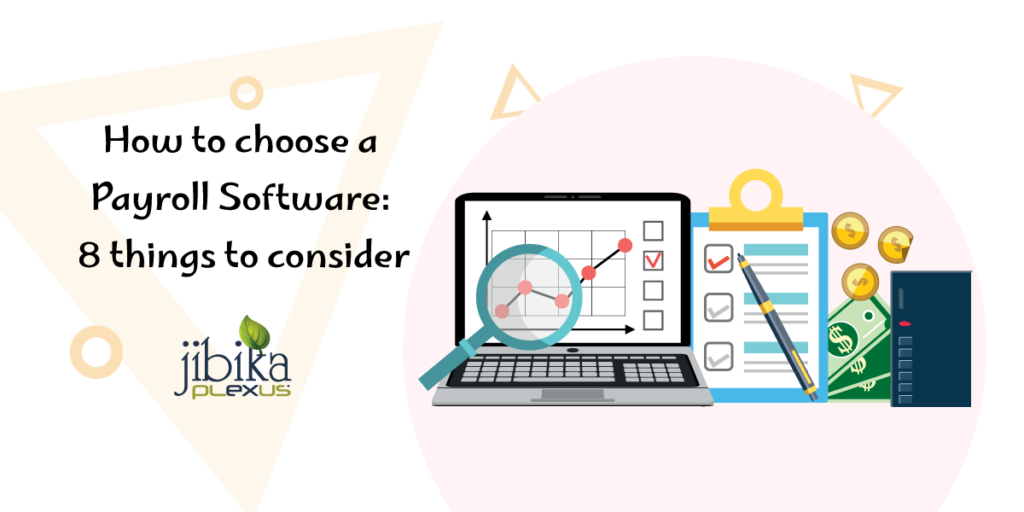Choosing payroll software is an important decision that ensures efficient and accurate operations of your business operations. Key factors like processing capabilities, business needs, budget-friendliness, ease of use, features of payroll systems, and more affect a lot in making this decision.
Today’s article will explain how to choose payroll software in detail. Here, you will learn about all the key factors to consider for choosing the right payroll software.
Let’s jump into reading and know the key factors.
How to Choose Payroll Software? You should Know Everything!
Payroll software is a special technology that automates and optimizes the employee salary management process. It assists a business by calculating payments, withholding taxes, processing payments, and maintaining compliance with labor and tax regulations.
By integrating all these functions, this software reduces manual errors, saves time, and ensures accuracy in employee payment management.
For efficient payment management in business, you should choose the right payroll software. From the following, you will get a detailed idea of how to choose payroll software, considering all the key factors.
Processing capabilities
To understand the processing capabilities of payroll software, you will evaluate its capability to perform the basic functions in payroll management.
The basic functions of payroll are the following:
- Calculating salaries, wages, bonuses, overtime, and commissions
- Automating tax calculations, withholdings, and filing.
- Calculating deductions for benefits such as health, insurance, retirement plans, etc.
- Integrating time tracking systems for accurate payments.
- Optimizing direct deposit, checks, and payroll cards.
- Generating payroll summaries, tax reports, law compliance records, labor law adherence, and tax regulations
- Incorporating employee self-service portal option
- Managing multi-currency and international payroll requirements.
- Linking with accounts and HR system
These functions ensure efficient and accurate payroll management. So, choose a software that features all of these processing capabilities.
Identifying business’s payroll needs
To identify your business needs, You should consider the following factors:
Company size: If you own a small or medium-sized company, you must look for payroll providers that deal with companies like yours. In the case of a big company, you should look for providers capable of dealing with big or enterprise types of companies.
Working pattern: Your company may follow different types of working patterns such as hourly, monthly, or contractual. When you choose any payroll software make sure that is capable of dealing with these transitions.
Additional requirements: If your company offers benefits such as health insurance, retirement plans, and more, make sure the payroll software you are choosing can manage all these additional requirements.
Listing up the desired features
Besides identifying your business needs, you should list the desired features that you want in payroll management. Because at the end of the day, it is your business, and you have to deal with all the issues, so, when choosing a payroll, you should make sure the software includes the features that you desire.
Budget-friendliness
Choose a payroll software that ensures quality with affordability. Stop rushing into cheap options, because they fail to ensure necessary features for customer service. Evaluate the key features such as monthly fees, subscription plans, or perpetual licenses and to make the perfect choice of a reasonable payroll software.
Ease of Use
When choosing payroll software, ease of use is a significant factor . Here, you will evaluate the software’s user-friendliness. User-friendly payroll software saves time and reduces mistakes in payroll management. So, choose user-friendly software that is simple to operate and easy to understand.
Flexibility in payment
A good payroll software should feature flexibility in payment. It should be capable of dealing with different payment vehicles such as direct deposit, debit card, or other payment options such as daily, weekly, bi-weekly, on-demand, and more. Such flexibility will allow you to pay the employees on time and keep them financially stress-free. With all these, you can boost the productivity and morale of the employees. So, when choosing payroll software, check this feature.
Tax compliance
Tax compliance is a very sensitive issue in business management. Good payroll software maintains tax compliance and ensures efficient business management. It helps in following the deadline of tax season and getting the tax forms to the employees on time and more. When choosing software, make sure it ensures tax compliance.
Considering security issue
In a company, you have to handle so much data, such as employee information, salary information, etc, and more. These data are highly confidential for the company. If any of this gets leaked, then your company may face consequences. So, before choosing any payroll software, you should ensure that feature a higher level of security.
Customer service quality
Before finalizing any payroll software, go through its’ previous customer service record, contact info, and reviews. With all these, you will develop a clear vision of the service quality to reach a conclusion.
Scalability
Make sure the payroll software you choose features a high level of scalability to deal with the company’s upcoming growth in future. This should be adjustable with the increasing number of employees, evolvement of the policies, and new features that the company expands.
Free trials and Demo review
When you finally list 3 to 4 top software providers in the market, you can go with a free trial or demo review ( if they offer one) for the final selection. Some providers offer free trials or demos, so you should grab the opportunity to evaluate the capabilities of the software.
Mistakes you should avoid when choosing payroll software
One common mistake that many made in choosing payroll software is prirotizing expenses over functionality.Affordability is important,but affordability with poor functionality may result in cost more in future.
Another mistake is failing to determine the future needs. Mostly, the small business owners fail to do this.
Then, looking for too much integration can be challenging in business. While choosing any software,prioritize simplicity over complicity.
FAQ
1. What is the most important factor to choose a payroll software?
Ans: The most important factor to choose a payroll software is the processing capabilities. The software should be capable of processing all the important functions.
2. What is implementation cost of a payroll software?
Ans: The implementation cost of a payroll software depends on the factors such as company size, employee number or payment plan. But now most of the providers offer monthly subscription of 8 to 49 months based on requirements and company size.
3. Is free payroll a good decision for hr management?
Ans: No, free payroll provides limited access and functionality that is not enough for efficient hr management. You may suffer in long run for this.
Conclusion
The choice of payroll software plays a vital role in business management. Ensure the software you choose, features processing capabilities, accuracy, high security, flexibility, sustainability and more. For making the perfect choice, you should read this article how to choose a payroll software. Here you will learn about the key factors to consider when choosing a payroll software.







